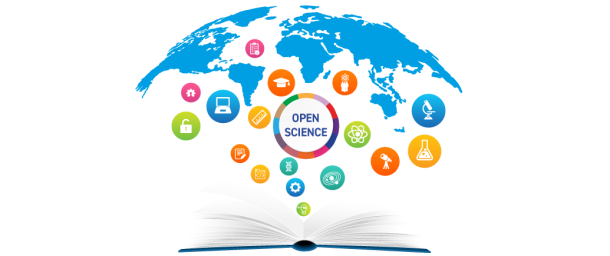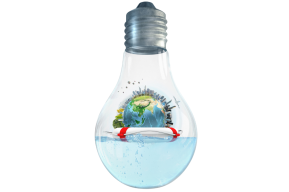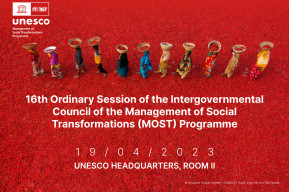Event
Open Science Day at the World Science Forum
7 December 2022

The Open Science Day, co-hosted by UNESCO and the African Open Science Platform, will be held in Cape Town on Wednesday, 7 December in the margins of the World Science Forum.
With a focus on the “Implementation of the UNESCO Recommendation on Open Science: From Principles to Actions”, the Open Science Day will be organized as a series of interactive dynamic multistakeholder dialogues between the invited speakers and the audience. It is aimed at taking stock of the progress made in supporting the implementation of the UNESCO Recommendation on Open Science, and to share lessons learned and practical approaches on open science.
The Open Science Day will start with a roundtable on “Open Science Trends and Practices Across the World”, followed by two dialogues:
- “Policies, Funding and Incentives: Diverse Practices for Creating an Enabling Environment for Open Science”;
- “Open Science Data and Infrastructures: Existing Infrastructures and Further Needs”.
The Open Science Day will also be the occasion to present the UNESCO Open Science Toolkit and to use this toolkit to provide training and peer-to-peer learning, which will target:
- Universities and early career researcher;
- Policymakers and funders.
Overall, the Open Science Day will provide a platform for researchers, publishers, funders, policymakers, civil society and other open science actors from across the world to exchange ideas, good practices, lessons learned from the implementation of open science practices, and to build coalitions and partnerships for the advancement of open science on individual, institutional, national, regional and international levels in line with the provisions of the UNESCO Recommendation on Open Science. A specific focus will be on the developments in the field of open science in Africa, to raise awareness on the existing open science platforms, tools, infrastructures, and practices on the continent.
Background
The Open Science Day (OSD) will be held at the Cape Town International Convention Centre (CTICC) on Wednesday, 7 December during the World Science Forum (WSF). The event is being co-hosted by UNESCO and the Africa Open Science Platform (AOSP).
The OSD is aimed at taking stock of the progress made in supporting the implementation of the UNESCO Recommendation on Open Science, and to share lessons learned and practical approaches on open science from across the world. The OSD will also be the occasion to present the UNESCO Open Science Toolkit and to use the toolkit to provide training and peer-to peer learning for the various relevant stakeholders on open science concepts and practices.
The OSD will provide a valuable platform for researchers, publishers, funders, policymakers, early career researchers and universities, civil society and other open science actors from across the world to exchange ideas, good practices, lessons learned from the implementation of open science practices, and to build coalitions and partnerships for the advancement of open science on individual, institutional, national, regional and international levels in line with the provisions of the UNESCO Recommendation on Open Science. A specific focus will be on the developments in the field of open science in Africa, to raise awareness of the existing open science platforms, tools, infrastructures, and practices on the continent.
The event will be organized as a series of interactive dynamic multistakeholder dialogues between the invited speakers and the audience, followed by two parallel training sessions.
Agenda
Part 1: Open Science Dialogues
9.00 - 9.30 am
Opening
- Mr Philemon Mphathi Mjwara, Director-General of the South African Department of Science and Technology, South Africa
- Mr Fulufhelo Nelwamondo, Chief Executive Officer, National Research Foundation (NRF), South Africa
- Ms Lidia Brito, Director, UNESCO Regional Office for Southern Africa, UNESCO
Moderated by Mr Ezra Clark, Director a.i., Division for Science Policy and Basic Sciences, UNESCO
9.30 - 10.30 am
Roundtable on Open Science Trends and Practices Across the World
- “How Open is Open Science?”
Mr Vincent Larivière, Canada Research Chair on the Transformations of Scholarly Communication, Université de Montréal, Canada (recorded message/online) - “Open Science in the Canadian Context”
Mr Naser Faruqui, Director of Education and Science, International Development Research Centre (IDRC), Canada - “Open Science in Africa”
Ms Nokuthula Mchunu, Deputy-Director, African Open Science Platform (AOSP) - “European Union’s Push for Open Science: Key Achievements, Challenges & Next Steps”
Mr Michael Arentoft, Head, Open Science Unit, European Commission (recorded message/online) - “The Arab Manifest for Open Science/Manifeste arabe pour la science ouverte”
Mr Abdelrahman Farrag, Professor of information sciences, Beni Suef University, Egypt, Founder and general coordinator of the Arab Community of Open Access (ACOA) - “A Long History of Open Science – Where do we stand now in Latin America and where do we go next? “
Ms Arianna Becerril-García, Co-Founder, AmeliCA - ‘‘Advancing Open Science in the USA: Impacts for American and Global Scientific Community”
AAAS (TBC)
Moderated by Mr Mathieu Denis, Acting CEO and Science Director, International Science Council
10:30 -11:00 am
Dialogue on Diverse Approaches for Creating an Enabling Environment for Open Science: Policies, Funding and Incentives with
- Mr Omo Oiaya, Chief Strategy Officer, West and Central African Research and Education Network (WACREN)
- Mr Andrés Izeta, National University of Cordoba, Argentina
- Ms Roheena Anand, Executive Director, Global Publishing Development, Public Library of Science, PLOS (online TBC)
- Ms Kerstin Jonsson Cissé, Head of Research Cooperation, Swedish International Development Cooperation Agency (SIDA)
- Mr Yaya Sangare, Secretary General, Fonds pour la Science, la Technologie et l'Innovation (FONSTI), Côte d’Ivoire
- Ms Erika Kraemer-Mbula, Professor of Economics, University of Johannesburg, South Africa, Advisory Board of the Declaration on Research Assessment (DORA)
- Ms Justine Germo Nzweundji, Global Young Academy, Cameroon
Moderated by Ms Heide Hackmann, Director of Future Africa and Advisor on Transdisciplinarity and Global Knowledge Networks, University of Pretoria
11.00 - 11.30 am
Coffee/tea break
11.30am - 12.00 pm
(Continued): Dialogue on Diverse Approaches for Creating an Enabling Environment for Open Science: Policies, Funding and Incentives with
- Mr Omo Oiaya, Chief Strategy Officer of West and Central African Research and Education Network (WACREN)
- Mr Andrés Izeta, National University of Cordoba, Argentina
- Ms Roheena Anand, Executive Director, Global Publishing Development, Public Library of Science, PLOS (online TBC)
- Ms Kerstin Jonsson Cissé, Head of Research Cooperation, Swedish International Development Cooperation Agency (SIDA)
- Mr Yaya Sangare, Secretary General, Fonds pour la Science, la Technologie et l'Innovation (FONSTI), Côte d’Ivoire
- Ms Erika Kraemer-Mbula, Professor of Economics, University of Johannesburg, South Africa, Advisory Board of the Declaration on Research Assessment (DORA)
- Ms Justine Germo Nzweundji, Global Young Academy (GYA), Cameroon
Moderated by Ms Heide Hackmann, Interim Director of Future Africa and Advisor on Transdisciplinarity and Global Knowledge Networks, University of Pretoria
12.00 - 1.00 pm
Dialogue on Open Science Data and Infrastructures: Existing Infrastructures and Needs
- Ms Iryna Kuchma, Open Access Programme Manager, Electronic Information for Libraries (EIFL)
- Ms Bianca Amaro, President, LA Referencia
- Mr Madara Ogot, CEO, UbuntuNet Alliance for Research and Education Networking
- Ms Maria Cotera, Business Development Manager, Figshare
- Mr Natarajan Ishwaran, Director, International Promotion, Deep-Time Digital Earth (DDE)
- Mr Andrea Lausi, Scientific Director, SESAME (Synchrotron-light for Experimental Science and Applications in the Middle East)
- Mr Frank Landon Bentum, Executive Manager, Africa Open Science Hardware (AfricaOSH)
Moderated by Mr Tshiamo Motshegwa, Director, African Open Science Platform (AOSP)
1.00 - 1.05 pm
Summary from the morning and next steps
- Ms Ana Persic, Programme Specialist, Science Technology and Innovation Policy, UNESCO
- Mr Sepo Hachigonta, Director of Strategic Partnerships, National Research Foundation (NRF
1.05 – 2:30 pm
Lunch
Part 2: Parallel Training Workshops
2:30 -4:15 pm
A. Training workshop for universities and early career researchers
Facilitators: Mr Ezra Clark, UNESCO & Ms Joy Owango, Training and Communication Centre (TCC) Africa
- Introduction & objectives
Ms Joy Owango, TCC Africa - Why Open Science for African Universities?
Mr Abednego Corletey, Association of African Universities (AAU) - Which platforms/infrastructures/networks exist on the continent?
Ms Jo Havemann, AfricArXiv - What are the opportunities and challenges for early career researchers?
Ms Justine Germo Nzweundji, Global Young Academy
Q/A with experts*: Overcoming some unintended consequences of open science: article processing charges, commercial exploitation of data, predatory behaviors…
- Ms Roheena Anand, PLOS*
- Ms Arianna Becerril-García, AmeliCA
- Mr Andrés Izeta, National University of Cordoba
- Ms Bianca Amaro, LA Referencia
- Ms Maria Cotera, Figshare
- Mr Abednego Corletey, AAU
- Ms Peggy Oti-Boateng, African Academy of Sciences
- Ms Susan Veldsman, Interacademy Partnership
- Mr Mathieu Denis, International Science Council
Implementing Open Science at Universities: UNESCO Toolkit Checklist, Mr Ezra Clark, UNESCO
2:30 - 4:15 pm
B. Training workshop for policymakers and funders
Facilitators: Ms Ana Persic, UNESCO & Mr Omo Oiaya, WACREN
- Introduction & objectives:
Mr Omo Oiaya, WACREN - Funding for Open Science: UNESCO Toolkit Guidance
Ms Ana Persic, UNESCO
Q/A with experts*: Integrating open science principles in science funding
- Ms Kerstin Jonsson Cissé, SIDA*
- Mr Yaya Sangare, FONSTI
- Mr Sepo Hachigonta, NRF
- Mr Naser Faruqui, IDRC
LIBSENSE Open Science Roadmaps and Regional Policy Development Workshops, Mr Omo Oiaya, WACREN
Q/A with experts**: Developing Effective National Open Science Policies (Ghana, Côte d’Ivoire, South Africa, Latvia)
- Ms Wilhemina Quaye, Ghana**
- Ms Annette Ouattara, Côte d’Ivoire
- Ms Nokuthula Mchunu, South Africa
- Ms Iryna Kuchma, Latvia
Developing Open Science Policies: UNESCO Toolkit Guidance, Ms Ana Persic, UNESCO
4:15 - 4:45 pm
Coffee/tea break
- Introduction and short reports from the parallel training workshops
Ms Joy Owango & Mr Omo Oiaya - Aligning policies, funding and incentives for open science: The role of research assessments
Peer to peer learning moderated by Ms Ana Persic, UNESCO, with experiences from:- Mexico (Ms Arianna Becerril-García),
- Argentina (Mr Andrés Izeta),
- Brazil (Ms Bianca Amaro),
- South Africa (Ms Erika Kraemer-Mbula),
- Latvia and Ukraine (Ms Iryna Kuchma),
- Ghana (Ms Wilhemina Quaye),
- Côte d’Ivoire (Ms Annette Ouattara),
- USA (TBC)
Closing
Mr Ezra Clark, UNESCO
6.00 pm
Networking cocktail





